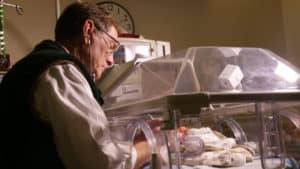Cornea Transplant Saves Vision of NICU Doctor
| For Whit Hall, M.D., a constant blurring of his vision made work more difficult. The nature of the work, however, required keen vision. Hall is a neonatologist in the UAMS Neonatal Intensive Care Unit.
“Many of our babies are very small,” said Hall. “In order to help the babies breathe, for example, we have to put a tube into the windpipe, and sometimes that can be a difficult procedure, especially in a very small baby.”
When he noticed that the blurriness in his vision sometimes made it difficult for him to locate or identify the appropriate structures during certain procedures, he began to contemplate the end of his practice.
“I was getting to where I was unable to practice medicine,” he said.
He found the reason for his deteriorating vision after visiting with David Warner, M.D., an ophthalmologist in the UAMS Harvey & Bernice Jones Eye Institute.
“I’d already had cataract surgery,” said Hall “As it turns out, I also had a condition called Fuchs’ dystrophy, which is where the eye tissue does not absorb the fluid that it should absorb.”
Warner had a solution: a transplant of the cornea, or outer layer of the eye, the most advanced procedure available to treat the condition.
“A lot of people have a condition known as Fuchs’ corneal dystrophy,” said Warner. “This is a genetic condition where the endothelial layer of the cornea wears out prematurely.”
To fix it, Warner had to make a microscopic incision in Hall’s left eye, through which he removed diseased corneal tissue. He then inserted healthy tissue provided by an organ donor.
“As soon as it adhered it allowed him to see again,” said Warner.
Hall said the procedure, which restored perfect vision to his left eye, saved his vision and thus allowed him to keep helping the most helpless — the tiny premature babies he sees daily.
“I’ve been practicing medicine now for five years that I would not have been able to do had it not been for that transplant,” said Hall.
Because of that, he remains ever grateful to the donor who saved his vision, a young girl who left him an incredible gift.
“I’m very grateful to the donor and her family. In fact, I’m grateful to all the families who donate their tissues and eyes and other organs and to the Arkansas Regional Organ Recovery Agency, which is a wonderful organization, because without these transplants and without this human tissue, many of us either couldn’t live or couldn’t function in the way that we need to function.”
He is also is grateful for the high level of care he received at UAMS.
“I have to say that UAMS did a wonderful job. I’m very grateful for the eye bank and the eye surgeons and the people who do this kind of work here. I couldn’t have been able to continue to do what I do without them.”

